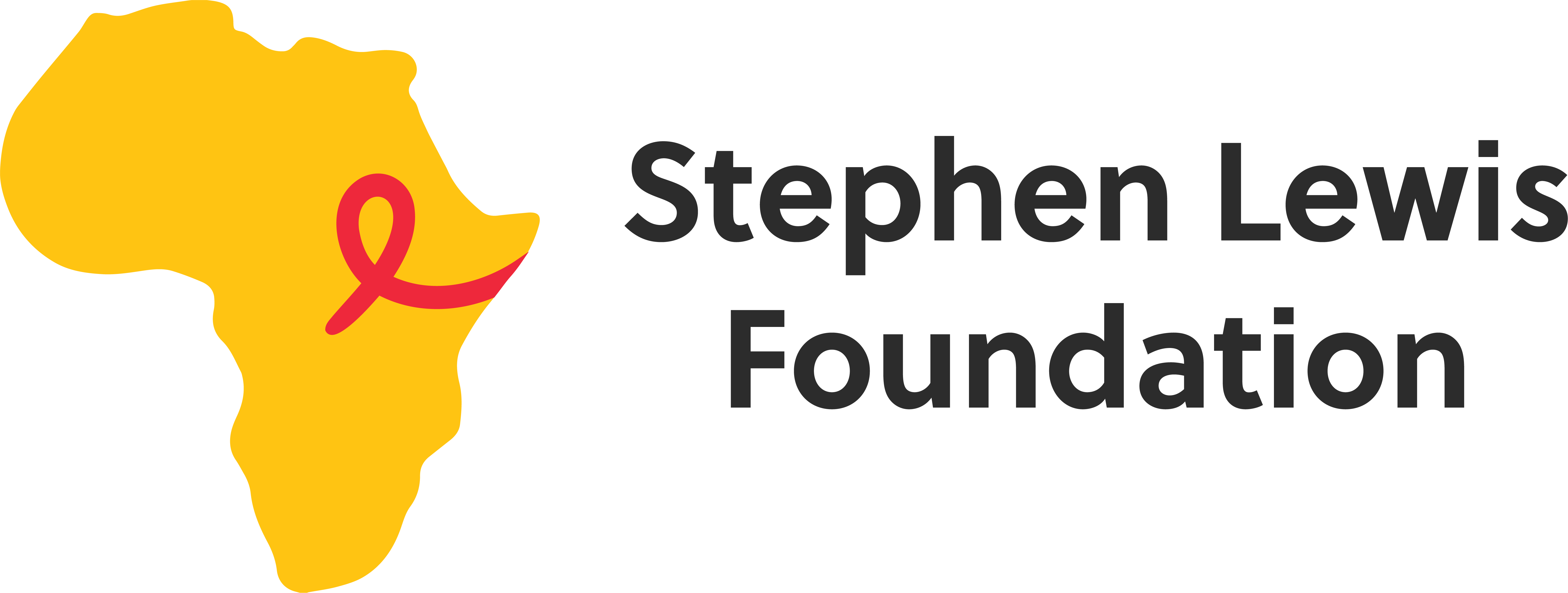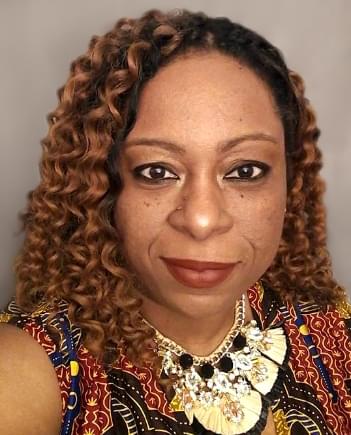Grassroots
SPRING 2024
Photo Credit: Neema Ngelime
Description: Rukia, PASADA
Location: Tanzania
“I am a criminal in Uganda. Why? Because I am a bisexual womxn.”
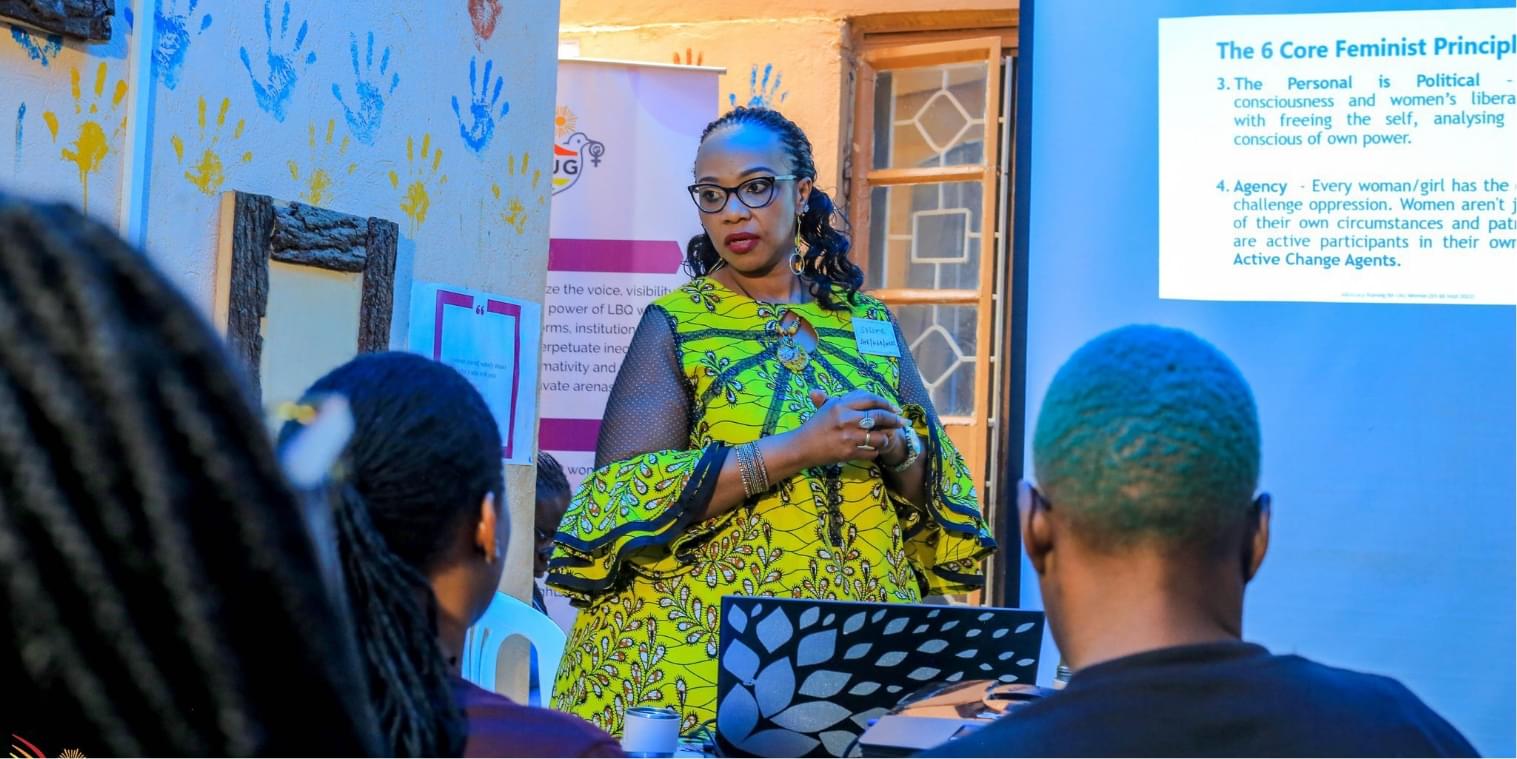
Photo Credit: FARUG
Location: Uganda
FARUG, a workshop in session.
Gloria Dhel recently shared these powerful words about her life in Uganda. She is Programs Director of Freedom and Roam Uganda (FARUG), a community-led organization and SLF partner that defends the right to health care access and safety at home for LGBTIQ communities. Like for so many members of LGBTIQ communities living in countries like Uganda, Gloria's human rights are not being respected. Every day she is forced to navigate intersecting forms of stigma, discrimination and violence, but will not give up hope.
“My dream is that one day I can live safe and free as a queer woman in Uganda,” she says. While much progress has been made in recent decades to secure women’s rights, some of the world’s most discriminatory anti-LGBTIQ policies and laws exist in sub-Saharan Africa where our SLF partners work.
LGBTIQ lives are marginalized, stigmatized and criminalized. They face significant challenges in accessing health services, including HIV prevention and treatment, and they do not have sufficient social or legal supports, personal safety, or protection of their basic human rights.
Gloria sees how pervasive anxiety, fear and uncertainties directly and negatively impact FARUG’s community and clients. She also feels she’s been well prepared to provide them with support.
“I was raised by FARUG. They have been central to my journey as a queer womxn, feminist and activist. I joined as a member, took on the role of a peer educator and now I am a leader.”
They’ve given me the space and safety to explore my talents, skills and capabilities. At FARUG I’ve been inspired to become an intersectional and feminist leader. I have also been introduced to and participated in many national, regional and international advocacy spaces.

Deplorably, in Kenya, Tanzania and Uganda, governments have recently introduced or passed even more stringent anti-LGBTIQ legislation, which is fuelling homophobia and transphobia. Targeted legislation, government surveillance, misinformation, and threats and violence are increasing.
As a direct result of Uganda’s 2023 Anti-Homosexuality Act and the dangerous increase in intolerance and hate that has followed, FARUG was recently evicted from their offices in Kampala, where they had been operating for years.
FARUG continues to prioritize safety for their staff and members amid increasing challenges, and are offering practical interventions, sharing coping strategies and mutual support.
Gloria speaks passionately about fortifying the next generation of human rights defenders and advocates, and the vital importance of investing in them. “They are the future that will change the status quo and address the most pressing calamities in the world, including homophobia, HIV and AIDS and climate change.”
Anti-LGBTIQ movements in sub-Saharan Africa are well funded and powerful, and they are having ripple effects beyond national borders, across the region and around the globe. They are spreading anti-LGBTIQ sentiments, and have extensive networks, alliances and influence to shift policy.
This is not just a local challenge. It is a global threat to health and human rights that requires both local expertise and international solidarity to address.
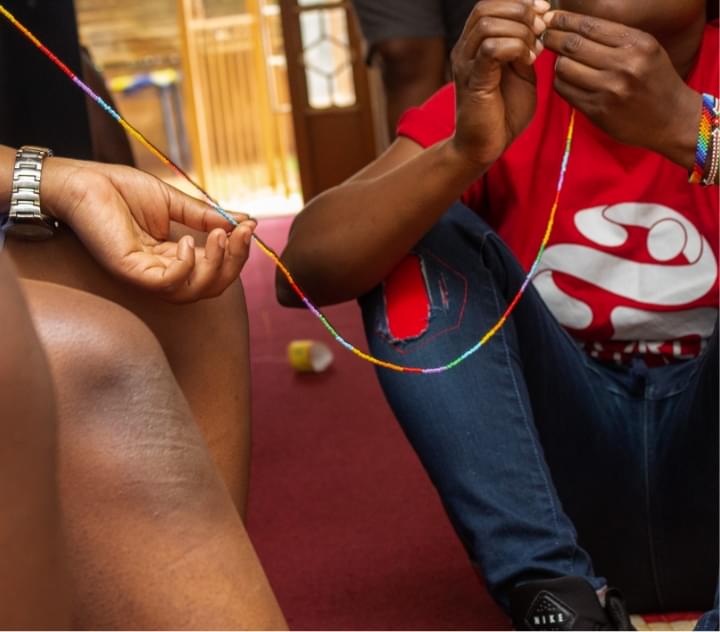
Photo Credit: FARUG
Location: Uganda
FARUG, a workshop in session.
Community-led organizations run by and for LGBTIQ communities can reach those most marginalized and persecuted.
The SLF has long-standing partnerships with organizations run by and for LGBTIQ communities who provide HIV prevention, testing and treatment, peer support and counselling, and legal and economic support. We are committed to repealing homophobic and transphobic laws, building inclusive communities, and championing health and human rights through legal action and advocacy. The SLF is committed to working alongside LGBTIQ communities every step of the way.

Strengthening human rights
We haven’t seen sufficient action from Canada in regard to investing in robust civil society organizations in Africa.
— Meg French, SLF Executive Director
This was the key message Meg French delivered to the House of Commons Standing Committee on Foreign Affairs and International Development on April 15, 2024, as a witness to their study of Canada’s Approach to Africa.
In her testimony, Meg drew on the Stephen Lewis Foundation's more than 20 years of experience partnering with community-led organizations in sub-Saharan Africa. She spoke about our work to secure increased investments in health and human rights funding, and our leadership in advocating for Canada to decolonize its approach to international assistance funding.
As she underscored the SLF’s significant experience and proven track record in decolonizing funding practices, and called for a transformation in the way Canada engages with the African continent, Meg also reminded the committee that their study should centre the expertise of African countries, communities, and civil society organizations.
Meg directly called on the government to increase Canada’s investment in health and human rights to ensure HIV and its root causes remain a priority.
Canada must move away from a top-down approach to international assistance to one in which community-led organizations, like the SLF’s partners, have access to flexible, long-term and core funding.
— Meg French
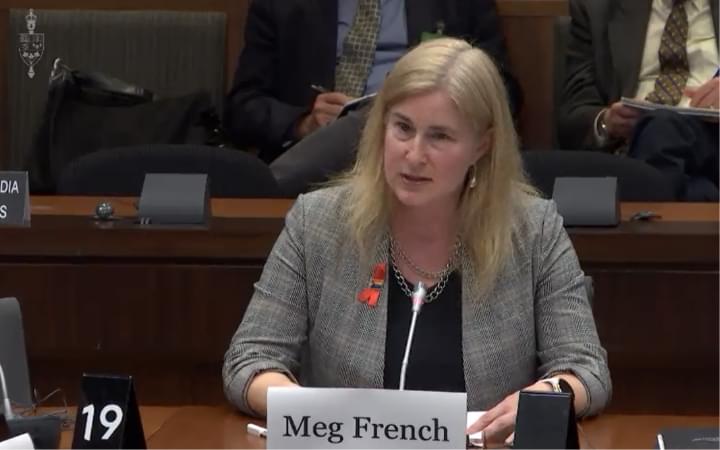
Photo Credit: SLF
To watch Meg’s testimony and read a transcipt of her remarks to the Standing Committee, visit https://theslf.org/Meg-French-remarks.
Together through our partnerships with community-led organizations, we are building a more just and equitable future and dismantling the root causes of the HIV epidemic.
About 67% of our SLF partners advocated for and defended human rights through their programming.
78% of those partners reached people who are living with HIV.
A changing climate and the impact on human rights
In 2023,
29% of our SLF partners implemented activities related to climate change.
Kenya, Malawi and Uganda were the countries with the highest number of SLF partners involved in climate change-related activities.
Climate change is jeopardizing human rights, including the rights to life, water and sanitation, food, health, housing and development. In increasing numbers and with steadily growing concern, SLF partners are sounding the alarm and calling for action.
They are experiencing increasingly unpredictable weather and natural disasters that devastate and decimate communities. Drought, cyclones and floods are destroying homes and displacing families. In under-resourced regions where communities are already experiencing food insecurity, erratic weather events are further threatening farming, fishing and income generation.
Recently, severe flooding has had serious impact for SLF partner HOYMAS in Nairobi, Kenya. In addition to its regular health and well-being services, the community-led organization is now also providing emergency relief — including food and medications, like anti-retroviral therapy (ART) — to mitigate the impact of the crisis on the HIV response.
HOYMAS is also helping to relocate some community members and assisting with the higher cost of rent in safer, less flood-prone areas for longer-term solutions.
St. Joseph’s Home in Zambia is reporting reduced rainfall throughout the region, which directly threatens food and income security. Many communities primarily depend on growing and selling produce.
In sub-Saharan African countries that rely heavily on agriculture, women, children and older people disproportionately suffer the immediate and long-term impacts of climate change.
Some of our clients stop taking their medication when they do not have enough food.
Food security is essential for HIV interventions to be successful for individuals and communities. For HIV medications to work, adequate nutrition is key to both HIV prevention and treatment adherence. People receiving ART require nourishment in tandem with reliable access to medications.
When people are displaced due to extreme weather events, continuity of care is at risk. In addition to risking access to food and safe water sources as well as medications and supports, communities affected by HIV are challenged in myriad ways.
Chiedza Child Care Centre has observed that drought in Zimbabwe is increasing rates of hunger among the children and families they serve. Chiedza noted how hunger is linked to lower school attendance for children in both urban and rural areas.
When there is hunger, food becomes the priority and children's education will not be prioritized.
In Uganda, Nyaka AIDS Orphan Project is also calling to attention the complex and dangerous health, social and safety impacts climate change is having for individuals and communities.
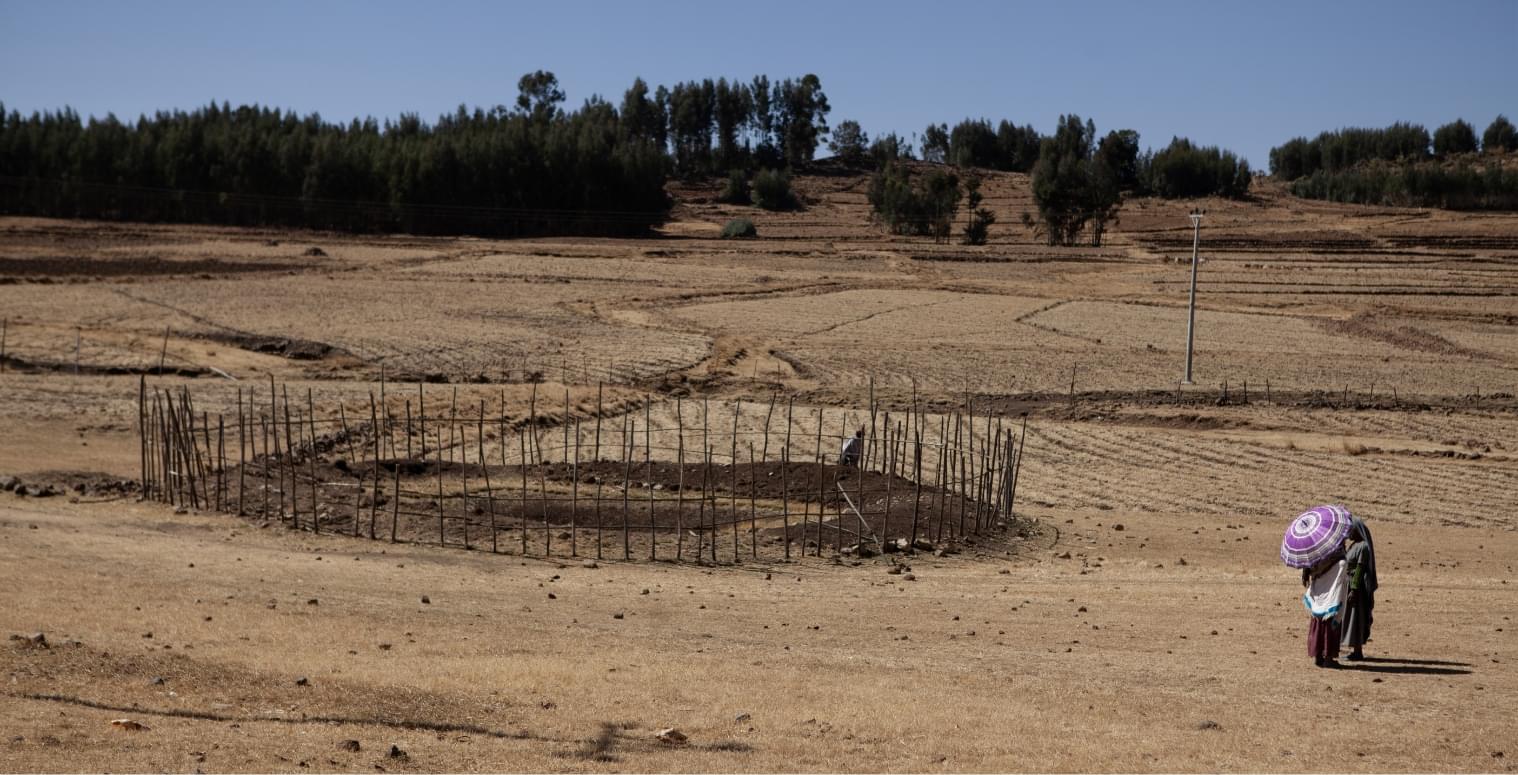
Photo Credit: Alexis MacDonald
Developing Families Together (DFT) water project, Ethiopia
The disruption of crop harvests means no livelihoods, hunger and increased incidences of sexual and gender-based violence.
As climate change is putting health and human rights at risk for families in already under-resourced communities in sub-Saharan Africa, the SLF continues our work with partners who are exploring and innovating ways to generate income, improve access to healthy food, and adapt to new climate challenges. They remain determined to protect their communities from the effects of environmental degradation and extreme weather events, in the context of the HIV epidemic.
Climate change is causing significant challenges for adolescent girls, including increased household responsibilities, environmental issues like floods, and lack of reliable water and sanitation services. These disruptions have intensified gender norms, burdening girls with additional domestic tasks and reducing their time for education. Additionally, climate change has exacerbated gender-based violence, leading to negative coping mechanisms like child marriage and extreme weather events. Food insecurity, particularly among adolescent girls, has led to high rates of anemia due to inadequate nutrition.
— BIDCAF, Uganda
Women and HIV: We must take priority in solutions
A message from Dr. Notisha Massaquoi, assistant professor in the Department of Health and Society, University of Toronto, founder and director of the Black Health Equity Lab, and SLF board member.
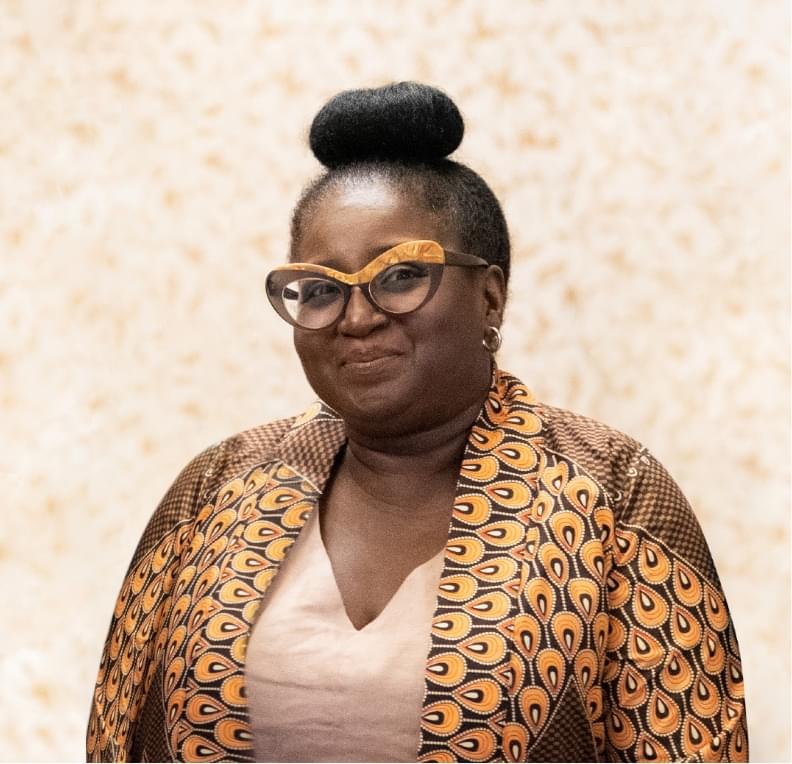
Photo Credit:Alexis MacDonald
Dr. Notisha Massaquoi
Gender is an unavoidable and necessary part of the conversation about HIV and AIDS. Globally, 20.2 million women are living with HIV, with 870,000 new cases annually being reported.
Women between 15 and 24 are twice as likely to acquire HIV, with AIDS-related illnesses being the leading cause of death for women in their reproductive years. This leaves senior women and young girls disproportionately affected by the burden of caregiving in the epidemic’s wake.
Despite the disproportionately high rates of women living with HIV, only 60% are able to access antiretroviral therapy (ART). The relationship between gender and HIV is complex and fuelled by gender inequality intersecting with social, biological and cultural factors. Understanding this relationship is crucial for effective prevention, treatment and care strategies.
By acknowledging and addressing the gender-specific factors that influence HIV risk, health outcomes, and access to treatment, we can move toward more effective and equitable solutions in the fight against the HIV epidemic.
HIV programming must take account of the gender dimensions of HIV and the resulting outcomes. Solutions must include gender empowerment initiatives that empower women economically and socially to reduce their vulnerability to HIV.
Increasing women’s access to reproductive health care that integrates HIV services can improve outcomes for women. Increasing women’s access to free ART and prevention technologies they can control, such as pre-exposure prophylaxis (PrEP), and increasing research to advance women-controlled prevention technologies, are crucial in a women’s focused agenda.
However, focusing solely on gender will not reach all women, particularly in the Global North. Canada, for example, has one of the most robust HIV responses globally, as well as universal health coverage, but still sees Black and Indigenous women making up 57% of all new HIV cases among women. Responses must be culturally and racially informed to address all members of society equitably.
As we approach 2025 and aim to reach the UNAIDS target of 95% of all people living with HIV knowing their status, 95% of those diagnosed receiving ART, and 95% of those on treatment achieving viral suppression, let us ensure that women are not overrepresented in the 5%.
We will not rest until they can rest.
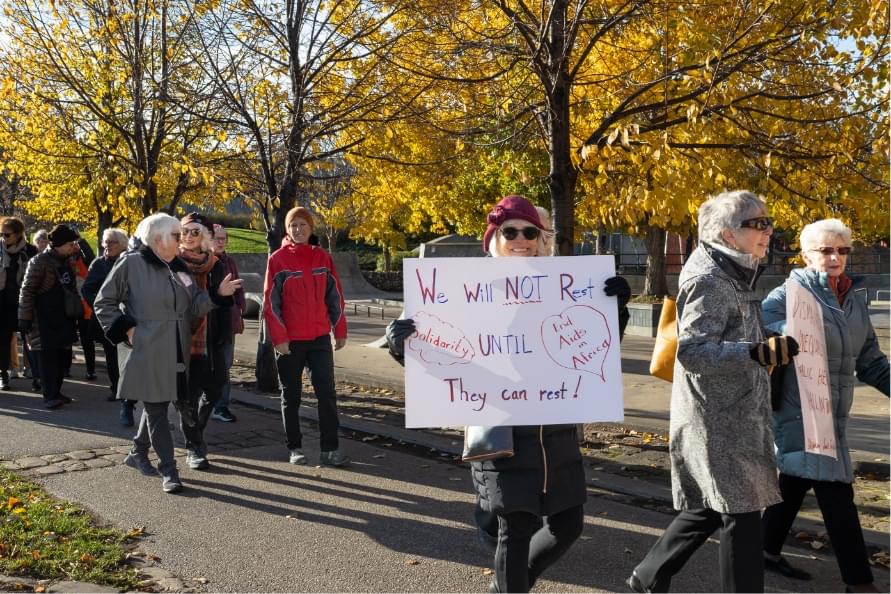
Photo Credit: Riley Martin Media
International Grandmothers Gathering (IGG) in Winnipeg, 2024
This is not a traditional charity model where we say, ‘We are here to help you.’ How we raise the funds is as important as the funds themselves. This isn’t charity; it’s sisterhood.
— Janine Reid, Royal City Gogos, British Columbia
This summer, expect clotheslines to grab your attention as they appear in sometimes surprising private and public spaces across Canada!
In honour of Grandparents’ Day (September 8), mobilized groups of grandmothers and grandothers will be creating clothesline installations, engaging with their communities and raising awareness about the impact of the award-winning and internationally recognized Grandmothers to Grandmothers Campaign.
The Clothesline Campaign, led by grandmothers groups and supported by the SLF, is driven by the critical need to keep HIV and grandmothers’ human rights on the global agenda. The Eastside Grannies of Sherwood Park, Alberta, put forward the idea to raise awareness about the vital role grandmothers have in addressing the impacts of the HIV epidemic in countries that bear the highest burden in sub-Saharan Africa.
The clothesline represents the role many grandmothers play as lines of support for their families and communities. Their day-to-day contributions, sometimes unrecognized and other times celebrated, have supported learning, connection, and healthy and strong communities through grief and joy.
We will not rest until they can rest. This rallying cry of grandmothers groups everywhere will be shared throughout the Clothesline Campaign. The declaration was first made at the Grandmothers Gathering in Toronto in 2006 and continues to guide the global solidarity movement. Grandmothers to Grandmothers Campaign members are reaffirming their commitment to working alongside African grandmothers to claim their rights and dismantle the inequities that allow the HIV epidemic to persist.
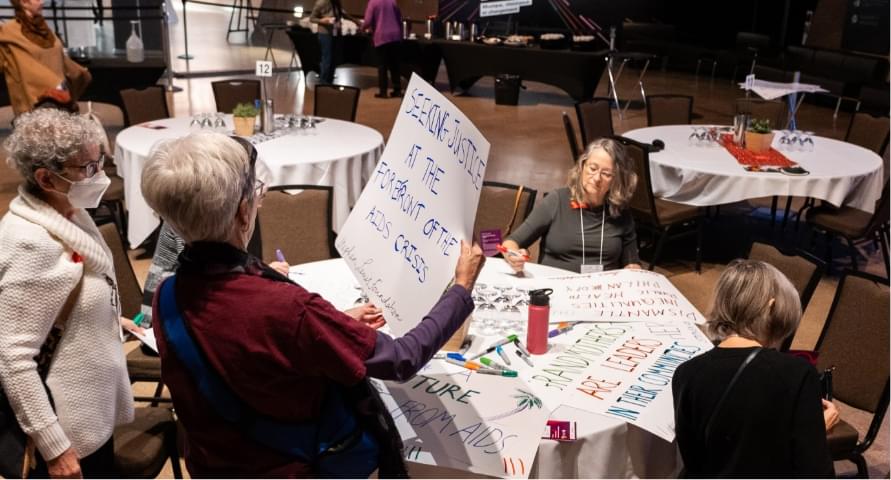
Photo Credit: Riley Martin Media
IGG 2024
Grandmothers and grandothers invite you to join them in celebrating Grandparents’ Day and fortify the grandmothers’ global solidarity and social justice movement. Connect with the SLF on Facebook, Instagram and X (formerly Twitter) for updates on Grandparents’ Day activities and visit the Grandmothers to Grandmothers Campaign website to find a grandmothers group near you. For more information, please email campaign@stephenlewisfoundation.org.
Your legacy has the power to inspire hope for generations to come.
In your lifetime, as a Stephen Lewis Foundation supporter, you have become part of a remarkable legacy that has helped our partners achieve so much. Despite making important gains in some areas, the HIV epidemic is still far from over. The next generation now faces a world forever changed by the reality of its far-reaching and long-lasting impacts.
As you have been steadfast in your solidarity with community-led organizations across sub-Saharan Africa, we now invite you to consider the future leaders who will navigate their families and communities toward a future free from AIDS.
Would you consider investing in the hopes, vision and efforts of the next generation who are continuing this vital work? Just as you support the work being done today, we hope that when you consider your legacy, you will envision a healthy, equitable future that is fuelled by a gift in your Will.
For more information, please email legacy@stephenlewisfoundation.org.
Partner: NLK
Location: Ethiopia
Credit: Alexis MacDonald
